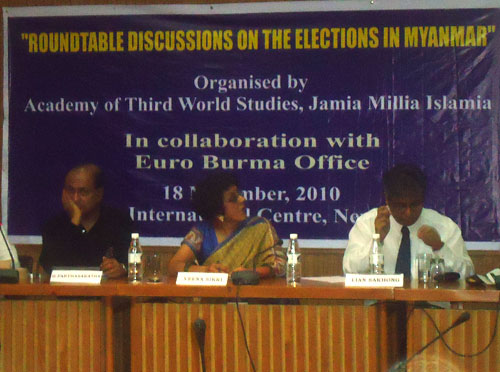Discussions on the recently concluded election in Burma were held by Indian political activists and a representative of the Burma Ethnic Nationalities Council ...
Discussions on the recently concluded election in Burma were held by Indian political activists and a representative of the Burma Ethnic Nationalities Council (ENC) on November 18, in New Delhi.
 The panel discussion, organized by the Indian Central University, Jamia Millia Islamia (National Islamic University), was held to develop a ‘pragmatic’ policy on Burma, according to Dr. Lian H. Sakhong, the Vice Chairman of the ENC.
The panel discussion, organized by the Indian Central University, Jamia Millia Islamia (National Islamic University), was held to develop a ‘pragmatic’ policy on Burma, according to Dr. Lian H. Sakhong, the Vice Chairman of the ENC.
“India and the international community recognize the important role of ethnic nationalities in Burma. Without finding a solution to ethnic issues, there can be no peace in Burma,” he said.
He also suggested India, China and the Association of Southeast Asian Nations (ASEAN) countries should play a leading role to organize an international conference on Burma, which will eventually lead to multi party talks inside the country.
He told Thailand-based Kachin News Group (KNG) that India has not developed a policy for Burma, but wants to prevent China from becoming more influential in Burma and the whole of Asia.
“Change should come from inside the country, not from outside,” said G. Parthasarathy, a diplomat, author and the former Indian Ambassador to Burma from 1992 to 1995.
“Ethnic minorities in Burma have been given some political space. This is the beginning of the process of transition,” said Mr. Parthasarathy, who retired as a Foreign Service Officer on May 31, 2000.
India is one of the neighbouring countries of Burma, which has been silent about the recently concluded election, won by the regime-backed Union Solidarity and Development Party (USDP). The election has been harshly condemned by opposition parties and members of the international community.
US President Barak Obama urged India, as the largest democracy in the world, to condemn human rights abuses by the Burmese regime, during his speech in the Indian Parliament, in New Delhi.
However Parthasarathy said, “India won’t do what Obama has suggested.”
Dr. Manmohini Kaul, Professor of Southeast Asian Studies, said, “India’s policy is based on realism, and we hope the regime’s ‘Roadmap to Democracy’ will happen.”
“The 2010 elections could be the start of reconciliation, but maybe the process will be slow,” said Dr. Marie Lall, a South Asia expert.
“International aid to Burma is still less than any other country - ten times less than Cambodia,” she said.


